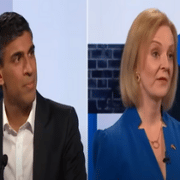Truss v. Sunak: Takeaway Lessons
Plenty of others are commenting on the political implications and the relative merits of the two candidates for party leader and prime minister in last night’s debate.
As you’d expect, I was watching with a more specialist lens. Before going further, I would say these debates are incredibly difficult for the candidates and a small misspeak could cost them the contest, so the stakes are very high. And actually, I thought both of them did pretty well.
By the end, I felt Truss who stayed calm and performed consistently throughout, never-the-less, knew that Sunak had outdone her and very interestingly said ‘I may not be the best presenter but I get things done’. I thought that was a smart thing to say and it stuck with me. Apparently, she has said this several times before so it is not a new line.
In terms of lessons for other presenters in less pressurised environments:
Don’t be rude! Whilst the odd, interruption or forceful disagreement on a particular point (to ensure it doesn’t go unchallenged) will be forgiven, constantly trying to hog the airtime is definitely bad manners and does not show anyone in a good light. Commentators have described it as bullying which is not a good look for a leader.
[There was also a lot of sexist reaction to this on Twitter and later on BBC Five Live with some saying Sunak ‘shouldn’t interrupt a woman’. One Truss supporter described his behaviour as ‘mansplaining’ – which I gather means being patronising, or man-splaying which is what I heard and I thought was a metaphor for taking too much of the metaphorical space or time. Either way, this is sexist tosh. Is anyone seriously suggesting that a male candidate should treat a female rival with more deference than he would a male contender!]
We often talk about the need for warmth in a presenter. I feel Truss lacks warmth and charm. She is very focussed and last night was very frowny, perhaps genuinely confused by Sunak’s uncharacteristic aggression. I had never thought of it before, but I will now add ‘don’t frown’ to my list of things to say to presenters when reacting to an opposing point of view. You want to indicate that you disagree without, I think, showing internal distress.
I favour a shake of the head and a sad smile of recognition; more of ‘I’ve heard this before and you are still wrong’ than ‘what the hell are you talking about’.
‘Use metaphors and be quotable’ is always on my list of how to be a good public speaker. Sunak had the best soundbites of the night, without a doubt.
He described tax cuts as a ‘short-term sugar rush …’ and said ‘£40 billion of unfunded tax cuts, that’s £40 billion of borrowing’ (what we call a contrasting pair or see-saw phrase for students of The Media Coach) and then likened it to ‘the country’s credit card’. This use of metaphor is much more memorable than just stating the case as Truss did “Under my plans, we would start paying back the debt in three years’ time, so I’m not putting it on the never-never.”
Connecting with your audience is also on everyone’s list of how to be a good presenter. But in this sort of debate which audience is the one to speak to?
Personally, I thought both, but particularly Truss, spent too much time talking about Stoke-on-Trent. Whilst they were the audience in the room and a couple of mentions would be a good idea, no one was under any illusion that this was not the audience that counted. The audience that mattered were Conservative party members in the country. Mis-analysing the audience is a mistake on many levels but crucially in this case it did not sound authentic from either of them.
Providing some personal details is also important if you are seeking to persuade or lead. People need to know where you are coming from. Both shoe-horned in enough of their personal story to satisfy this. Sunak mentioned more than once helping his mother with the accounts of her pharmacy in Southampton and Truss talked again about her schooling in Leeds. They both sounded genuine and did this better than many other politicians have done. Authenticity counts for a lot and is one of the subconscious scorecards that is so difficult to read as a performer.
And talking of subconscious judgements, what I saw was Sunak just a lot more comfortable than Truss. He mostly looked as if he was really enjoying himself, whereas she looked grim. As an audience, it is much more pleasurable if the presenter is having fun. It’s difficult to teach this and is something that really only comes from the experience of public speaking.
Trust is a really big issue in this contest and, of the two, Truss answered questions in a much more straightforward way than Sunak. On several occasions, it was obvious Sunak was sidestepping, whereas Truss was more direct. I have seen Truss dodge many questions in other interviews but last night she made a real effort to be direct, perhaps betting that any obvious obfuscation would have played badly. In our Media Training, we constantly stress you must address the questions of a journalist even if you don’t want to give a full and detailed answer. If you don’t you lose trust.
If you face a challenging public speaking event, consider personal coaching to help you address all considerations and all options for coming across as you would wish. Clients repeatedly tell us, that just a few hours of coaching can make a huge difference.
- A Behind-the-Scenes TV Cheat… and Why It Works - November 26, 2025
- What Should I Do With My Hands? - November 19, 2025
- A Jar of Marbles and the Power of a Simple Story - November 12, 2025




Leave a Reply
Want to join the discussion?Feel free to contribute!